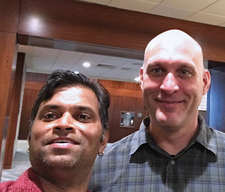An interview with Greg Kroah-Hartman
World Domination

© ©Swapnil Bhartiya
Greg Kroah-Hartman is one of the friendliest faces of the Linux kernel community. He maintains the stable branch of the Linux kernel and participates in many more Linux projects. He works at the Linux Foundation as a fellow, a job that allows him to dedicate his time to the Linux kernel. I sat down with Greg to talk about the kernel, 25 years of Linux, and what he does with the rest of his life.
Greg Kroah-Hartman is one of the friendliest faces of the Linux kernel community. He maintains the stable branch of the Linux kernel and participates in many more Linux projects. He works at the Linux Foundation as a fellow, a job that allows him to dedicate his time to the Linux kernel. We meet each other at almost every Linux-related conference. I sat down with Greg to talk about the kernel, 25 years of Linux, and what he does with the rest of his life.
Linux Magazine : What and how much has Linux achieved in these 25 years?
Greg Kroah-Hartman : We had this joke: "Total world domination was our goal." Everybody laughed at us. Then we did it, and nobody even noticed. I mean, we're everywhere. We're going places that Linux has never been. It's crazy to think that this project we all started working on for fun, myself included, has done this. It's insane.
[...]
Buy this article as PDF
(incl. VAT)
Buy Linux Magazine
Subscribe to our Linux Newsletters
Find Linux and Open Source Jobs
Subscribe to our ADMIN Newsletters
Support Our Work
Linux Magazine content is made possible with support from readers like you. Please consider contributing when you’ve found an article to be beneficial.

News
-
The Next Linux Kernel Turns 7.0
Linus Torvalds has announced that after Linux kernel 6.19, we'll finally reach the 7.0 iteration stage.
-
Linux From Scratch Drops SysVinit Support
LFS will no longer support SysVinit.
-
LibreOffice 26.2 Now Available
With new features, improvements, and bug fixes, LibreOffice 26.2 delivers a modern, polished office suite without compromise.
-
Linux Kernel Project Releases Project Continuity Document
What happens to Linux when there's no Linus? It's a question many of us have asked over the years, and it seems it's also on the minds of the Linux kernel project.
-
Mecha Systems Introduces Linux Handheld
Mecha Systems has revealed its Mecha Comet, a new handheld computer powered by – you guessed it – Linux.
-
MX Linux 25.1 Features Dual Init System ISO
The latest release of MX Linux caters to lovers of two different init systems and even offers instructions on how to transition.
-
Photoshop on Linux?
A developer has patched Wine so that it'll run specific versions of Photoshop that depend on Adobe Creative Cloud.
-
Linux Mint 22.3 Now Available with New Tools
Linux Mint 22.3 has been released with a pair of new tools for system admins and some pretty cool new features.
-
New Linux Malware Targets Cloud-Based Linux Installations
VoidLink, a new Linux malware, should be of real concern because of its stealth and customization.
-
Say Goodbye to Middle-Mouse Paste
Both Gnome and Firefox have proposed getting rid of a long-time favorite Linux feature.
